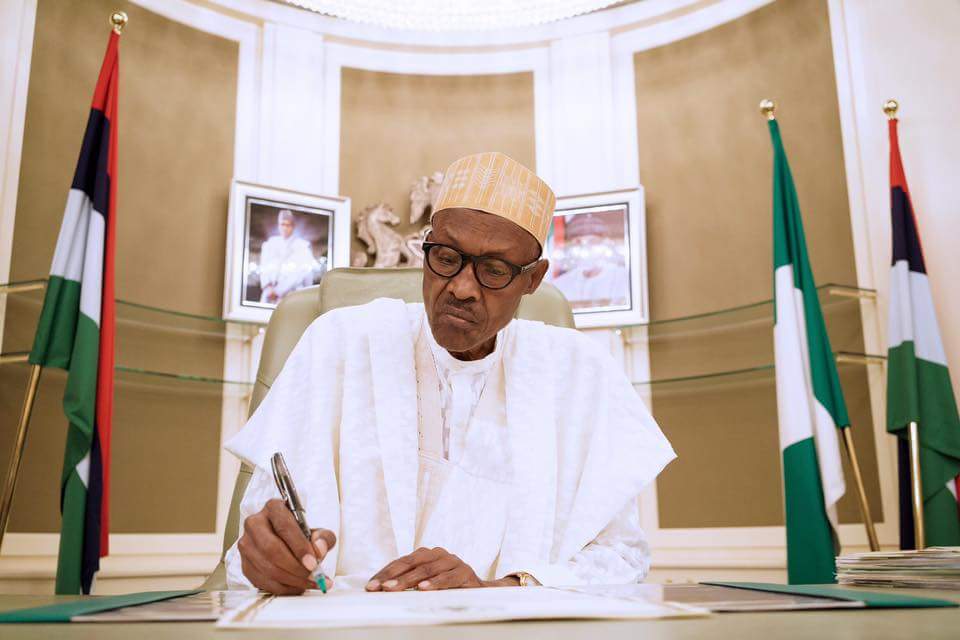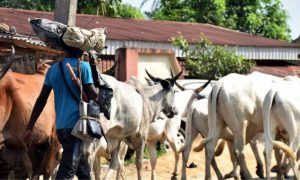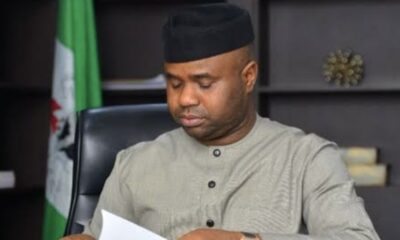Nigeria News
BREAKING: FG borrowing plan: Nigeria’s debt profile set to hit record breaking N38trillion

Nigeria’s debt profile is set to hit a record N38 trillion amidst the federal government’s borrowing plan to finance the budget deficit.
The subtle devaluation of Naira, increased Eurobond and domestic borrowing rates, according to economic experts, are also expected to impact Nigeria’s debt cost in the year.
The Federal Executive Council recently approved N895 billion supplementary budget for the year as a result of expenditure that was not initially planned or envisage, thus increased the total budget for 2021.
Market Forces Africa reports that Cordros Capital Limited received the fourth quarter of 2020 budget implementation report from the budget office and observed that the federal government’s fiscal deficit was wider than preliminary estimates.
The firm said total revenue in the fourth quarter of 2020 settled at N824.87 billion, which was 38.5% below the budgeted amount of N1.34 trillion due to declines across major non-oil revenue sources.
The report added that in the period, corporate income tax underperformed government expectation at 25.8%, value-added tax dropped 14.0% and Nigeria’s share of signature bonus declined by 99.9%.
Analysts at Cordros Capital noted that the total expenditure of N2.68 trillion during the review quarter outperformed the budgeted estimate of N2.49 trillion by 7.6%.
Thus, the fiscal deficit printed N1.86 trillion in the fourth quarter of 2020, bringing the actual deficit to N6.60 trillion or 4.3% of GDP. This was N453.13 billion above the preliminary estimate of N6.15 trillion.
“Looking ahead, we expect the recovery in economic activities to support FGN non-oil revenue amidst a price-induced increase in oil revenue. However, we expect the government’s expansionary fiscal stance to keep expenditure elevated. Overall, we expect the 2021 fiscal deficit between N5.01 trillion and N5.42 trillion”, Cordros said.
Debt Management Office (DMO) revealed that Nigeria’s public debt stock increased by 0.6% in the first quarter to N33.11 trillion from debt record profiled in the fourth quarter of 2020 which settled at N32.92 trillion.
Analysts highlighted that the increase in the debt stock was due to a 2.1% increase in domestic debt to N20.64 trillion in the first quarter of 2021 from N20.21 trillion in the final quarter of 2020.
Meanwhile, external debt which accounted for 37.7% of total debt declined by 1.9% to N12.47 trillion or $32.86 billion in the first quarter following the redemption of the $500.00 million Eurobond.
“Barring the Securitisation of the outstanding CBN’s Ways and Means, we expect the total public debt stock to hit N37.78 trillion in 2021F in line with the additional borrowing by the States and FGN to fund their 2021 fiscal operations – estimated at N4.86 trillion”, the Cordros Capital report added.
On year on year basis, Nigeria’s debt surged 15.64% to N33.11 trillion from N28.63 trillion as of March 2020. The year-on-year increase in the country’s total debt stock was chiefly due to a 24.86% rise in external debt.
Total external debt jumped to N12.47 trillion (or $32.86 billion at N379.50/$) as atu March 2021 from N9.99 trillion (or $27.67 billion at N361.00/$) in March 2020.
Cowry Asset Management said within a year, Nigeria received $3.48 billion worth of loans from the International Monetary Fund (IMF) and $1.43 billion was gotten from International Development Association (IDA).
In the first quarter of the year, Nigeria paid part of its Multilateral ($81.05 million), Bilateral ($61.38 million) and Commercial loans ($500 million) which amounted to $642 million.
As a result, external debt service payments fell to N126.02 billion (or $332.07 million) in the first quarter of 2021 from N170.60 billion (or $472.57 million) printed in the first quarter of 2020.
A breakdown of the total external debt stock in the first quarter of 2021, showed that Multilateral loans accounted for 54.26% ($17.83 billion) of which loans from IDA was $11.09 billion, loan from IMF was $3.48 billion while others stood at $3.26 billion.
Bilateral loan accounted for 12.73% ($4.18 billion) of which loan from China (Exim Bank of China) was $3.40 billion and loan from France was $0.49 billion in the first quarter of 2021.
The breakdown shows that commercial loans accounted for 32.47% ($10.66 billion) of which Eurobonds was $10.37 billion while Diaspora bond was $0.30 billion.
However, local debt stock increased by 10.71% to N20.64 trillion in the first quarter of 2021 (from N18.64 trillion in the first quarter of 2020).
A further breakdown of the domestic debt figure showed that FG’s domestic debt stock rose to N16.51 trillion in the first quarter of 2021 (from N14.53 trillion in first quarter of 2020).
Despite the significant rise in FG’s domestic loan, local debt service payment increased marginally by 0.59% to N612 billion in the first quarter of the year from N609.13 billion recorded in the comparable period in 2020.
“We expect Nigeria’s local debt and the annualised implicit interest rate (8.92%) to increase in 2021 given the President’s request to the National Assembly to approve N2.34 trillion new capital raising”, Cowry Asset said.
It added that the rising domestic interest rate environment witnessed in recent times will further exert upward pressure on debt service.























